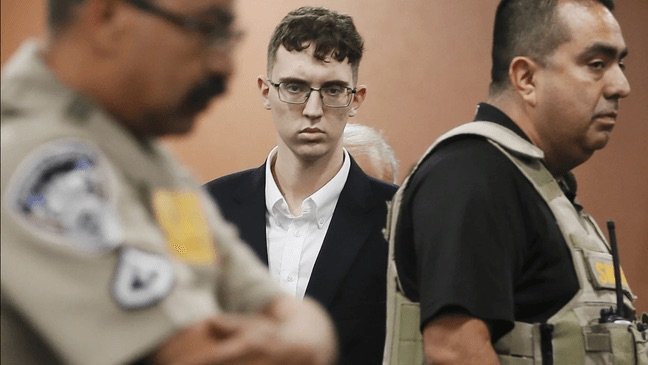The gunman responsible for the 2019 mass shooting at a Walmart in El Paso, Texas—an attack that left 23 people dead in what authorities called a racially motivated assault—will not face the death penalty under a plea agreement announced Tuesday.
Patrick Crusius, who had already been sentenced to multiple life terms in federal court, will now receive a state sentence of life in prison without parole, effectively ensuring he will never be released. El Paso County District Attorney James Montoya said the decision to forego the death penalty was largely influenced by the wishes of victims’ families, many of whom wanted the case resolved rather than drawn out for years.
“I could see this case being delayed until at least 2028 if we continued to pursue the death penalty,” Montoya explained, adding that while some families were willing to wait for a potential execution, most wanted closure.
Crusius, now 26, had previously pleaded guilty to federal hate crime charges and was sentenced to 90 consecutive life terms in 2023. The Biden administration opted not to seek the death penalty in the federal case, though prosecutors did not publicly elaborate on the reasoning.
Republican Texas Governor Greg Abbott voiced his opposition to the plea deal, stating, “A crime like this is exactly why we have capital punishment.”
A Deadly Act of Hate
On August 3, 2019, Crusius, then 21, drove more than 700 miles from his home near Dallas to El Paso, targeting Hispanic shoppers at a Walmart near the U.S.-Mexico border. Before carrying out the attack, he posted a racist manifesto online warning of an impending “Hispanic invasion” of Texas. Armed with an AK-style rifle, he opened fire inside and outside the store, killing 23 people and injuring dozens more.
His writings echoed hardline anti-immigration rhetoric, and investigators noted that he had expressed support for border security policies, including the construction of a border wall. His online manifesto suggested that he believed Hispanic immigrants were taking over the U.S. government and economy.
Crusius’ attorneys argued that he suffered from schizoaffective disorder, a mental illness associated with delusions and mood disturbances. Federal prosecutors acknowledged his diagnosis but did not formally cite it as the reason for not pursuing the death penalty.
Families Divided on Justice
For some victims’ relatives, the plea deal brings a sense of relief. Elise Hoffmann-Taus, whose father Alexander Hoffmann was among the victims, said, “This is the outcome I wanted. I’m just glad it’s over.”
However, others expressed frustration that Crusius would not face execution. Montoya, a Democrat who took office in January after defeating a Republican incumbent, admitted that he personally supports the death penalty and believes Crusius deserved it but ultimately prioritized the families’ desire to move forward.
A Tragic Legacy
The attack was one of the deadliest mass shootings in U.S. history and sent shockwaves through the country. The victims ranged from teenagers to elderly grandparents, including several Mexican nationals who had crossed the border for routine shopping trips.
Following his conviction, Crusius agreed to pay over $5 million in restitution to victims’ families, though court records indicated he had little to no assets.
While the legal proceedings are now drawing to a close, the shooting remains a stark reminder of the devastating consequences of hate-fueled violence. Former Attorney General Merrick Garland emphasized after Crusius’ sentencing, “No one in this country should have to live in fear of hate-driven attacks.”

 English
English



























































